 For a long time, Cisco was only focused on high-end corporate sales. This started to change with its acquisition spree. Back In June 2003 it acquired Linksysin order to attack the home and small business markets.
For a long time, Cisco was only focused on high-end corporate sales. This started to change with its acquisition spree. Back In June 2003 it acquired Linksysin order to attack the home and small business markets.
Under the Cisco banner, Linksys have madefurther acquisitions, including Kiss Technologies whoproduce DVD and media streaming solutions (at the higher end of the consumermarket).
Now Cisco have acquired Scientific Atlanta (SA), a massive company, who make set-top-boxes (STBs)mainly for cable companies, but more recently in the IPTV space (i.e.they have an Ethernet connection and video out/SCART socket or equivalent).
IPTV the future of TV
It’s now widely agreed that the future of broadband is what’s known as triple-play (the combinationof Internet, voice and video). In the past, cable companies have held avirtual monopoly on this market as CATV (cable TV) was the only technology thatcould deliver the bandwidths needed. However with the advent of new DSL (DigitalSubscriber Lines) technologies such as ADSL2+, they too can be usedto deliver triple-plays.
 DSL is much cheaper to install as it uses existing phone cabling, ratherthan CATV which requires digging up the road, installing fibre tothe street and co-axial cable to the home (this may not be true forgreenfield sites, but in countries with existing infrastructure likethe UK it is).
DSL is much cheaper to install as it uses existing phone cabling, ratherthan CATV which requires digging up the road, installing fibre tothe street and co-axial cable to the home (this may not be true forgreenfield sites, but in countries with existing infrastructure likethe UK it is).
In Europe, IPTV is starting to take off in a big way, broadband pricesare plummeting as operators offer the basic services for very low cost,hoping customers will take premium services.
In the UK, Sky acquired Easynet (a local loop unbundler) and they aregoing to launch an IPTV service next year (possibly more).
Cisco has a lot of clever people working there and as has seen the market grow. Now they want theirpiece of the pie. Hence the SA purchase.
Core networks
It’s not like IPTV is new to Cisco. They’ve have had an IPTV solution for several years, but theirs was aimed atthe enterprise customer (i.e. big businesses).
Cisco’s core business is, and will continue to be, selling high-endnetwork equipment to the telecoms and cable companies, ISPs, etc. All of this high-end network equipment can be IPTV-enabled.
 Though Cisco have bought Scientific Atlanta, who manufacture the consumerpiece of the puzzle, by expanding the consumer take-up of IPTV they arealso expanding the core network business. Don’t forget, running IPTV servicesrequires a lot of investment in network infrastructure i.e. moreCisco kit.
Though Cisco have bought Scientific Atlanta, who manufacture the consumerpiece of the puzzle, by expanding the consumer take-up of IPTV they arealso expanding the core network business. Don’t forget, running IPTV servicesrequires a lot of investment in network infrastructure i.e. moreCisco kit.
Cisco are coming close to becoming a fully horizontally integrated company. After the SA purchase, there’s only a few bits missing. The actual content creation, which we think it is highly unlikely to get into – it’s far too messy, involves troublesome humans and is an unknown to them.
The other is the content encoding/delivery part. Who knows, that maybe another acquisition on Cisco’s horizon?
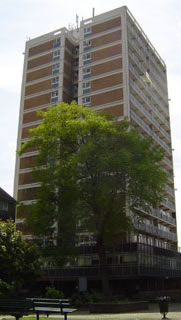 A project starting early next year in East London hopes to bridge the digital divide by broadband-enabling a number of housing estates.
A project starting early next year in East London hopes to bridge the digital divide by broadband-enabling a number of housing estates.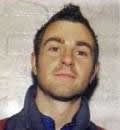 Happily, this project is focused on the original residents, not the ones who live in the £1/2m flats – sorry, apartments.
Happily, this project is focused on the original residents, not the ones who live in the £1/2m flats – sorry, apartments. Additional services include a Health channel allowing patients to book GP appointments, provide virtual consultations and on-line health and diagnosis information; a Consumer Channel, allowing on-line group buying of common services such as gas, electricity and mobile phone tariffs; and an Employment Channel, providing on-line NVQ courses, local jobs Websites and virtual interview mentoring.
Additional services include a Health channel allowing patients to book GP appointments, provide virtual consultations and on-line health and diagnosis information; a Consumer Channel, allowing on-line group buying of common services such as gas, electricity and mobile phone tariffs; and an Employment Channel, providing on-line NVQ courses, local jobs Websites and virtual interview mentoring. The futuristic vision of a connected home with content moving seamlessly from our TV to our PC and on to our mobile device is still a long way off, according to key speakers at The Connected Home conference in London today.
The futuristic vision of a connected home with content moving seamlessly from our TV to our PC and on to our mobile device is still a long way off, according to key speakers at The Connected Home conference in London today. It took Dimitri Van Kets (pictured left), from Belgian telco, Belgacom, to voice what many were thinking by announcing that the networked home was “little more than a mass of standards” and “too confusing” for the average consumer. Unless the service providers get together and educate customers, he said, true home connectivity was never going to happen.
It took Dimitri Van Kets (pictured left), from Belgian telco, Belgacom, to voice what many were thinking by announcing that the networked home was “little more than a mass of standards” and “too confusing” for the average consumer. Unless the service providers get together and educate customers, he said, true home connectivity was never going to happen. Paul Szucs of Sony said that service providers should “try not to lose the plot with content protection”, adding that “consumers simply want their devices to work together and share content.”
Paul Szucs of Sony said that service providers should “try not to lose the plot with content protection”, adding that “consumers simply want their devices to work together and share content.” BT will roll out IPTV in ‘late summer 2006’, according to Andrew Burke, CEO, BT Entertainment, (pictured right) speaking at the Enhanced TV Show in London today.
BT will roll out IPTV in ‘late summer 2006’, according to Andrew Burke, CEO, BT Entertainment, (pictured right) speaking at the Enhanced TV Show in London today.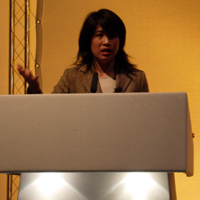 Elena Branet, Senior Marketing Manager at Microsoft TV, (pictured left) said IPTV would allow viewers to use picture in picture channel surfing, see caller ID on their TV sets, or watch TV while messaging a virtual community of friends and family. She said that basic IPTV would be possible with a minimum connection speed of just 1.5 MB.
Elena Branet, Senior Marketing Manager at Microsoft TV, (pictured left) said IPTV would allow viewers to use picture in picture channel surfing, see caller ID on their TV sets, or watch TV while messaging a virtual community of friends and family. She said that basic IPTV would be possible with a minimum connection speed of just 1.5 MB. Also at the show, David Bainbridge, MD of Yes, Yoo Media, (pictured right) said trials of a new product, ‘Broadband TV’ would start on ntl in October. Not to be confused with IPTV, this is a solution to help content creators repurpose content across platforms – working with cable TV, IPTV and 3.
Also at the show, David Bainbridge, MD of Yes, Yoo Media, (pictured right) said trials of a new product, ‘Broadband TV’ would start on ntl in October. Not to be confused with IPTV, this is a solution to help content creators repurpose content across platforms – working with cable TV, IPTV and 3. Verizon has launched an IPTV service in Keller, Texas delivered over their fiber-to-the-premises network.
Verizon has launched an IPTV service in Keller, Texas delivered over their fiber-to-the-premises network. Verizon are offers three set-top boxes: standard definition for $3.95/month; HD for $9.95/month; and a digital video recorder set-top box with HD channels for $12.95 permonth. Content packages between $13/month – $40/month are layer on top of this.
Verizon are offers three set-top boxes: standard definition for $3.95/month; HD for $9.95/month; and a digital video recorder set-top box with HD channels for $12.95 permonth. Content packages between $13/month – $40/month are layer on top of this. Armchair football fans around Europe will soon be able to enjoy live Champion’s League matches over the Internet and mobile phones.
Armchair football fans around Europe will soon be able to enjoy live Champion’s League matches over the Internet and mobile phones. Champions League coverage in the UK is provided by BSkyB and ITV (both of whom look likely to retain their current rights), and the Internet simulcasts could provide a honey pot for new revenue streams with advertising and betting partners.
Champions League coverage in the UK is provided by BSkyB and ITV (both of whom look likely to retain their current rights), and the Internet simulcasts could provide a honey pot for new revenue streams with advertising and betting partners. BSkyB has already announced its commitment to
BSkyB has already announced its commitment to 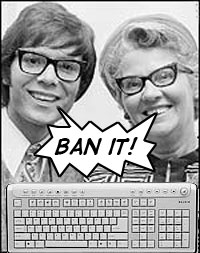 ‘The Man’ in the form of the EC wants to introduce regulation to the Internet by bringing in controversial rules to cover television online, according to a report in the Times.
‘The Man’ in the form of the EC wants to introduce regulation to the Internet by bringing in controversial rules to cover television online, according to a report in the Times.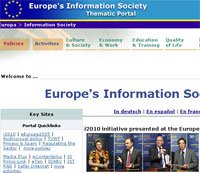 Internet-delivered TV is currently unregulated in the UK, so there is no compulsion for Web broadcasters to respect rules governing accuracy and impartiality or taste and decency that apply to all other analogue and digital channels.
Internet-delivered TV is currently unregulated in the UK, so there is no compulsion for Web broadcasters to respect rules governing accuracy and impartiality or taste and decency that apply to all other analogue and digital channels. In a cornucopia of convergence, BT has announced their intention to use the Microsoft TV Internet Protocol Television (IPTV) Edition software platform to deliver TV over broadband in the UK. Internally within BT, the project is referred to as Project Nevis.
In a cornucopia of convergence, BT has announced their intention to use the Microsoft TV Internet Protocol Television (IPTV) Edition software platform to deliver TV over broadband in the UK. Internally within BT, the project is referred to as Project Nevis. As the sound of mutual backslapping threatened to reach ASBO-generating levels, Moshe Lichtman, corporate VP of the Microsoft TV division gushed:
As the sound of mutual backslapping threatened to reach ASBO-generating levels, Moshe Lichtman, corporate VP of the Microsoft TV division gushed: See our interview with co-founder of OurMedia,
See our interview with co-founder of OurMedia,